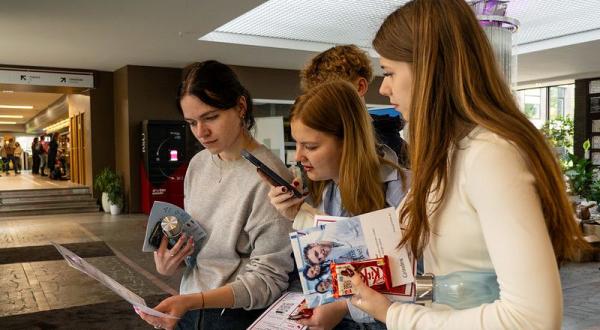How to conquer the world through startup entrepreneurship
Is there a chance of becoming the local Bill Gates, Steve Jobs or Mark Zuckerberg by studying Startup Entrepreneurship at RSU? Yes there is, because this study programme is aimed at those who not only want to learn the basics of entrepreneurship, but also want to shake-up and astonish the world. Kristaps Zaļais, the Head of the Study Programme, explains that this time the story is about start-ups that are scalable, that want to expand all over the world and that want to change the industry or their sector. It is a story about ambitious young people who are not afraid to take risks, to dream of conquering the world with their ideas and who want to develop their leadership skills and the ability to motivate a team.
Ambition is not enough
To achieve this kind of entrepreneurship energy and ambition are not enough, but rather requires specific knowledge such as a grasp of marketing, understanding patent rights, the ability to manage finances, design business models etc. According to Zaļais startups that, for example, want to develop their company’s marketing during its initial stages generally do not have the money they need. Nobody expects the creator of a business idea to have saved half a million first, and to only then start implementing the idea. You need a little capital to start with, but it needs to be distributed and used efficiently for the investment to achieve the best results.
Kristaps Zaļais. Photo: Aivars Liepiņš, Dienas mediji
Close relationship with leaders
The Startup Entrepreneurship study programme is being implemented in close cooperation with startups that have already fought their way up, and have proven themselves. Anatomy Next is one such startup, which is well-known in the United States. Representatives from these companies share their experience in lectures; they present students with real business issues to solve, or even provide placement opportunities at their companies. Sometimes students remain in permanent employment. A placement at a startup with five or six employees has its advantages, because they do not need staff to bring coffee or arrange paper by colour, they need all of their staff to be actively involved in the daily work of the company.
A business incubator at RSU
This year students of the study programme Startup Entrepreneurship will have a new, terrific opportunity to implement their unique ideas as RSU is launching a business incubator in the autumn. Here students will receive various types of theoretical and practical assistance and will be able to work in placements there. Zaļais tells us that it is not necessary to come in with a business idea straight off the bat, an idea that has already been developed and worked on, but that it will be possible to create and develop ideas during the training. This can be done by working in the business incubator, or by joining in to help develop someone else’s idea.
Drone Pilot
Asked to give a meaningful example, the Head of the Programme tells us about graduate Kristers Jurševskis whose business idea was to develop an app for remote-controlled aircrafts or drones called Drone Pilot. With the help of this app it is possible to map drones and determine their location. This is necessary to mitigate a variety of potential risks, such as the possibility of the drone falling onto someone in public and causing injury. Another risk is for the drone to fly onto a military base, an airport, a port or any other area where, out of security considerations, drones are not allowed to fly. These risks can be avoided by a special chip mounted on the aircraft that tracks its route. If the drone were to fly onto a closed military facility, or airport, the drone would be instructed to leave the area immediately. The owner of the drone would also be made aware of the accident and would be able to prevent it. The app Drone Pilot is available for download.
The business idea behind the drone-mapping app came into being and took its first steps in Latvia, was developed in Estonia, and is now in Dubai in an accelerator which is a special supportive environment. Zaļais explains that an accelerator, compared to a business incubator, is the next stage of support for young entrepreneurs who have already proven themselves. The period of time that you can get help with your project within the accelerator is shorter, but more funding is available. Dubai has one of the best-known and desirable accelerators in the startup world.
All roads are open to graduates
According to Zaļais this is an excellent example, but not the only one. The first students graduated this programme last year. It is interesting that five out of seven graduates continued their studies abroad, which, according to the Head of the Study Programme, is the right way to go – to get an idea in Latvia, and launch it here, and then move elsewhere to develop it internationally, because the idea behind startups is to conquer the world!





